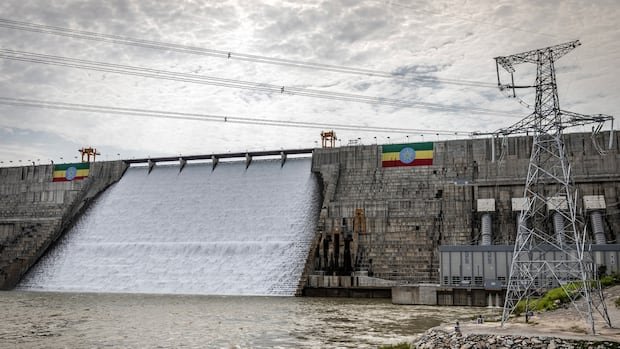The Grand Ethiopian Renaissance Dam (GERD), towering over the Blue Nile and spanning almost two kilometers, signifies a nation-building effort and a potential economic advancement that has been in progress for 14 years. Today, it officially becomes Africa’s largest hydroelectric project, despite sparking concerns in downstream countries like Egypt due to its nearly $6 billion Cdn cost. For Ethiopia, its completion is a source of national pride, representing self-reliance and a shift towards a future where millions no longer rely on traditional cooking and lighting methods.
Moses Chrispus Okello, a senior researcher at the Institute for Security Studies in Addis Ababa, highlighted the significance of the dam as a transformative infrastructure project that marks a shift from Ethiopia’s past to a promising future. Designed to store 74 billion cubic meters of water and generate 5,000 megawatts of electricity, the GERD is set to double the country’s current energy capacity. This development is expected to position Ethiopia as a dominant energy player in the Horn of Africa, enabling it to export electricity to neighboring countries such as Djibouti, Tanzania, Sudan, South Sudan, and Kenya, thereby boosting its foreign currency reserves.
However, while Addis Ababa celebrates this milestone, Cairo views it with apprehension. Egyptian President Abdel Fattah al-Sisi considers the dam a threat to his country’s water security and has pledged to safeguard Egypt’s interests by all available means. With Egypt heavily reliant on the Nile River to sustain its population of 110 million, any reduction in water flow could have severe implications for agriculture, employment, and national stability. The conflict stems from the 1959 Nile Waters Treaty, which disproportionately allocated water rights to Egypt and Sudan, leaving upstream nations like Ethiopia with no share, despite contributing most of the river’s water.
Sudan shares Egypt’s concerns about potential impacts on agriculture and downstream dams due to decreased water flow. Ethiopian Prime Minister Abiy Ahmed has reassured neighboring countries that the dam will not harm them. Despite numerous mediation efforts, including those by the African Union, Russia, and the U.S., the dispute remains unresolved. John Mukum Mbaku, an African water expert and professor, emphasizes the need for a cooperative regional approach to manage the dam effectively to prevent adverse consequences for Egypt and Sudan.
For Ethiopia, the GERD symbolizes a unifying force and a testament to national sovereignty, as it was funded by Ethiopians themselves after Egypt’s diplomatic efforts blocked international financing. This self-financing model has made the dam a dual symbol of economic progress and national independence for Ethiopians. Beyond Ethiopia, the project serves as a model of development independent of international loans, showcasing African achievement and self-reliance.


